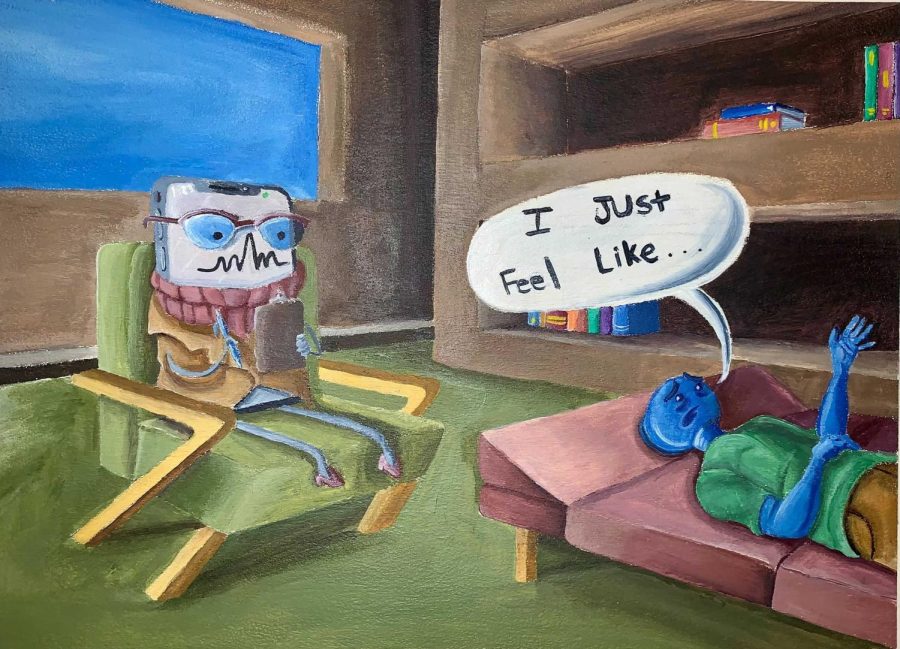“I Just Feel Like…” Illustration by David Mesquita
There’s an App for That… Or is There?
How helpful are mental health apps in providing support to those who need it?
April 21, 2022
Click the play button above to listen to an audio version of this article.
The number of mobile applications designed to help people with mental health needs has grown in response to growing demand during the pandemic.
The pandemic led to a 27% increase in cases of major depressive disorders and a 25% increase in cases of anxiety disorders globally, said Dr. Tom Insel, former director of the National Institute of Mental Health, in a recent article in the medical journal The Lancet.
According to the Centers for Disease Control and Prevention, self-reported mental health symptoms have increased. Stress-related symptoms, anxiety, depression, substance abuse and even suicidal thoughts have nearly doubled the rate since before the pandemic.
Mobile health apps for smartphones and tablet devices have become a lucrative business, with worldwide expenditures estimated at more than $92 billion for 2019, according to a study published by the National Center for Biotechnology Information. Mental health apps generate about $6 billion globally, according to the market research firm Fact.MR, and are projected to reach $17.5 billion by 2030, according to Business Wire.
Mental health apps address a range of mental health issues with a variety of services. Some apps provide therapy, connecting practitioners with patients in counseling sessions. Other apps help people meditate, boost their moods or beat addictions, while others claim to give users the tools to reduce anxiety or stress.
Apps like BetterHelp, Cerebral, and Talkspace provide online therapy by connecting patients with licensed medical professionals in real time.
The primary value of these apps is their efficiency. They allow patients more access to a variety of mental health care providers and ease of assistance.
“Apps can provide many things that traditional therapy often cannot: They are usually cheaper and they don’t require a commute to an office,” Insel said for California Healthline.
Mobile apps allow patients to get help from the safe space of their own homes. For some, visiting the doctor is stressful and mobile apps can help by ensuring that those who are reluctant to leave home due to anxiety, the lack of physical mobility or finances can still see a mental health care provider.
“The privacy of using an app gives some individuals the feeling of separation they need while still being able to find answers to their questions within the comfort of their own homes,” said social worker and psychologist Sal Raichbach to Psycom.net.
For those patients who are fearful of talking about their issues face-to-face, mobile apps may provide the privacy they need.
Mobile might be a good way to begin treatment, especially for those who have no previous experience in seeking help or mental health services.
“The apps can be a first step, meaning that sometimes if we’ve never had any experience with treatment, we may have a picture in our mind of what it’s like. And so the unknown is always scary. And so if we start with the app, we can start to demystify the mental health treatment process,” said Alejandra Acuna, associate professor of social work at CSUN.
The number of mental health apps may be expanding rapidly, but their quality remains a question for a number of reasons.
Most apps that claim to give medical guidance do not have empirical studies behind them, so users cannot know if they are really beneficial. While users may rate apps in stores, those ratings won’t tell users if the app is suitable for them.
Personal searches in the app store can lead to apps that seem to target the searcher’s needs, but they can also show a variety of irrelevant search results stemming from a single word. Many of the medical experts acknowledge that consumers are getting little guidance on how to choose a reputable option in the app store.
“Development has really outpaced the science,” said Stephen Schueller, clinical psychologist and UC Irvine professor, in an article in News Medical. In many cases, app creators are focused on creating more content and putting quantity ahead of quality. Deciding which mental health apps are beneficial comes down to the consumer’s own research.
